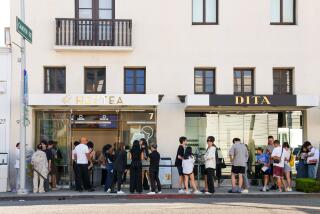Tea & Tranquillity
- Share via
In Old Hong Kong, members of Triads, organized crime groups would take their disputes to a neutral place, typically a Chinese teahouse. There, the serene atmosphere and formality allowed dissenting parties to reach a mutual agreement. Everyone then shook hands and departed in peace.
This method, no longer used in modern Hong Kong, is unlikely to replace the judicial system in litigious-happy L.A. But teahouses ranging from the simple to the sublime are establishing themselves like gentle islands in a sea of cappuccinos, catering to those who do not partake of coffee or those who merely desire a break from it. “America is adopting tea as a complement to its coffee habit. People get their jump-start with coffee, but rather than keep on caffeinating themselves throughout the day, they’re coming into a place where they can be nourished and quieted down,” says Jeffrey Stein, president of Elixir Tonics & Teas, near the Pacific Design Center.
At Elixir, patrons can indulge in herbal blends and concoctions that promise a range of curative powers, from “The Morning After Hangover Reprieve” to “The Silk Thread, a classic PMS stabilizer.” Sip a cup of Snow Dragon, a green tea whose loose leaves sell for $10 an ounce, as you reflect on the vagaries of life from any of the seven separately carved-out seating areas in the shop’s Japanese-styled garden, where bamboo sways and water burbles from a fountain.
“The medical benefits of tea abound,” says Edgar Veytia, Stein’s partner. “Tea, in addition to being a very strong antioxidant, lowers blood cholesterol and has a natural form of fluoride. The caffeine in tea doesn’t quite have the same crash-and-burn effect that a lot of people seem to experience with coffee. People like tea because it gives them a nice ‘up’ without getting them too whacked out.”
Such “ups” can also be obtained at Chado Tea Room in West Hollywood, which features cucumber sandwiches, egg salad sandwiches (called “Punjab Wheels,” wherein the eggs are marinated in a smoked tea such as Lapsang Souchong before being combined with mayonnaise and chives) and homemade scones along with the 250 varieties of teas stacked in jars behind Chado’s counter. Czar Alexander, Yerba Mate, Admiral’s Cup. Mango Flip, Pharaoh, Eros . . .
Doubling as a one-stop shopping mecca for tea enthusiasts, these shops offer everything from herbal supplements for your dog to a $175 iron teapot from Yamagata, “preferred by tea ceremony masters,” both at Elixir. Available at Chado are Yixing teapots ($35-$400), cherished by tea lovers for the clay’s beauty and tea-enhancing characteristics, along with what seems like all the teas in China . . . and the rest of the world.
MATCHA
Two types of powdered tea, or matcha, are used in Japanese tea cermonies. Koicha and the weaker Usucha. Matcha is the color of jade and has a mildly bitter taste. To brew tea in the Japanese style, one serving: Using a bamboo tea whisk, whisk together approximately one half-teaspoon powdered tea and six tablespoons boiling water in a tea bowl. Whisk 30 times, until frothy. Traditionally served without milk, sugar or lemon. Or the tea can be iced and served with sugar syrup.
MARBLED TEA EGGS
(Adapted from “Tea in the East,” by Carole Manchester (Hearst Books).
In the tea shops of Hong Kong, the drink is traditionally served without food. Occasionally, hard-boiled eggs that have been steeped in tea, made from Ti Kuan Yin and other oolongs for flavor and Bolei for color, are served as accompaniments.
(Makes 6 eggs)
12 large eggs
1 1/2 teaspoons coarse (kosher) salt, plus additional salt for serving
3 tablespoons loose Chinese black tea, such as Lapsang Souchong, orange Pekoe
2 tablespoons soy sauce
2 star anise, broken into pieces
2 cinnamon sticks
Pour enough cold water in saucepan to cover eggs by 1 inch. Add salt. Bring to simmer over medium heat and cook for 5 minutes.
Transfer eggs to bowl of cold water, reserving cooking water in saucepan. Let eggs stand until cool. With back of large spoon, rap shell of each egg until shell is covered with web of cracks.
Add tea leaves, soy sauce, star anise and cinnamon to water in saucepan and bring to boil over high heat. Reduce heat to low. Return eggs to saucepan, cover and simmer gently until eggshells have turned brown, about 2 hours. Remove from heat. Cool eggs in the liquid to room temperature. Cover saucepan and refrigerate overnight. (The eggs will keep for up to four days.) Strain steeping liquid through fine sieve and reserve.
Peel eggs and cut crosswise in half. Serve chilled, with small bowls of the cooking liquid and coarse salt.
Styled by Ann Johnstad
More to Read
Eat your way across L.A.
Get our weekly Tasting Notes newsletter for reviews, news and more.
You may occasionally receive promotional content from the Los Angeles Times.








